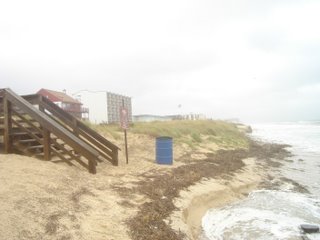Tuesday, Oct. 31, 2006
It would have been premature to break out the brandy and cigars, but there was a distinct air of jubilation in the Norfolk law offices of Andrew M. Sacks last Tuesday, Oct. 24, over the Virginia Supreme Court’s decision to award an appeal in the case of William S. Kerry et al. v. City of Norfolk et al.
That’s the suit brought by the grassroots Bay Oaks Park Committee over the petition for a referendum on whether four City Council ordinances that clear the way for residential development in 21 acres of open green space in East Ocean View should be repealed.
Sacks, pro bono counsel for the Committee, has been in a legal duel for over a year with a team of seven attorneys assembled by Norfolk and its affiliated Redevelopment and Housing Authority in the effort to preserve as open space the unique stand of trees, including many indigenous southern live oaks. The area is along E. Ocean View Ave. between 3rd and 7th Bay Sts.
In a sit-down meeting in his fifth-floor conference room looking out across Boush St. Sacks told local journalists, with key members of the Committee attending, that the Supreme Court’s decision "is a major step toward reversal."
Sacks had appeared in Richmond on Oct. 18 (as reported in last week’s Port Folio Weekly) before a panel of three justices, arguing that Judge Alfred D. Swersky was in error in his decision at a Feb. 23 pre-trial hearing to throw out the petition because, as the City argued, it was improperly constructed.
Calling the reasoning "Dickensian" in its "hyper-technicality," Swersky nevertheless agreed with the City that, rather than a single petition, four petitions, each with a minimum of 4,000 signatures each, were required to call for the repeal of four ordinances. The Committee had submitted 4,423 officially certified signatures on its single petition.
Sacks countered that the City Charter, which delineates the rules for citizen petitions, does not address the bundling of ordinances on a petition, except to say "(r)eferendum petitions need not contain the text of the ordinance or ordinances" citizens seek to amend or repeal. This alone, Sachs maintains, indicates there is nothing improper in the single petition he crafted for the Committee.
Further, the panel’s "very quick turn-around" — dated Oct. 23, only "three business days" after oral argument, suggests the justices "are very interested in our position," said Sacks.
Significantly, he said, in a single sentence in its order, the Court also dismissed an "assignment of cross-error" filed by the appellees — the City and NRHA — appealing Swersky’s two rulings in favor of the Committee.
The first contended that the Committee had misled the public by promoting its drive as an effort to save Bay Oaks Park when it was really about repealing ordinances that would not accomplish that. The second held that zoning issues determined by a city council are not subject to referendum or judicial review.
In rejecting both these arguments, Sacks says, the court has already "given the referendum process a vote of confidence."
Procedurely, Sacks has 40 days from Oct. 23 to file a brief in support of the appeal, to be followed by a response from the appellees and a final reply from Sacks for the appellants. The process is likely to extend into January, after which the court will schedule oral arguments, not likely to take place, he estimates, before March. A final decision might not come until early summer.
If the ruling upholds the Committee’s petition, a referendum must be held between 30 and 60 days after a judge enters the order with the clerk of courts. But the court could decide to send the case back to Norfolk Circuit Court for trial, based on Sacks argument that Swersky’s decision for dismissal was premature on "structural" grounds because the city had not moved for such a judgment. Dismissal without granting the appellants a trial, Sacks contends, was improper.
"But because they have accepted the case...it’s my sense of it that the court will decide if the judge (Swersky) was right or wrong."
To date, "the city has never asked us what we wanted," says Bill Kerry, Committee chair. Conceivably, though, the City could resolve the issue in a negotiated settlement with Committee members, in which case the appeal would be withdrawn.
But, as Committee members acknowledge, there’s an issue of trust. Unless City Council repeals the four ordinances, to stop the process short of a referendum on repeal could violate that trust.
The first step, says Committee member Ann Fitzgibbon, is to save the land. What kind of a space it should be then becomes a matter of community input.
Funny thing as that the Virginian-Pilot did not cover this story!!!




